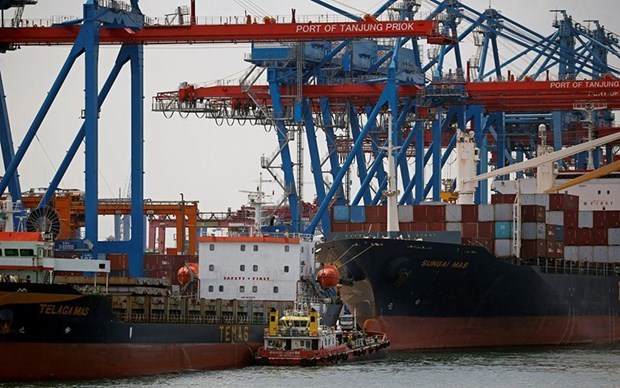Indonesia aims to catch up with Vietnam's trade with EU
 Tanjung Priok Port in Jakarta, Indonesia. (Photo: Reuters)
Tanjung Priok Port in Jakarta, Indonesia. (Photo: Reuters)Jakarta (VNA) – Indonesia's Trade Ministry is convinced that the country's
foreign trade will surpass that of Vietnam after the completion of
the Indonesia-European Union Comprehensive Economic Partnership Agreement
(IEU-CEPA).
Kasan Muhri, the ministry's trade policy agency
chief, said on March 6 that once the agreement has been completed and
implemented, Indonesia’s market access to the European Union (EU) will obtain a
greater benefit than what Vietnam gets.
He said Indonesia was left behind by Vietnam,
which already has a trade agreement with the EU, giving it an advantage in
exporting to the European market.
Indonesia's trade with the EU in 2022 reached
only 46 billion USD, as compared to 94 billion USD in trade value Vietnam recorded in the same
year after the CEPA came into force, he noted.
Kasan believed that Indonesia will complete its
IEU-CEPA this year, thereby enabling it to catch up with Vietnam's trade with Europe.
He underscored the importance of IEU-CEPA in
opening more access for Indonesian exports since once Indonesia can export its
commodities to the EU, accessing other markets becomes easier.
He emphasised that Indonesia, whose economy is
greater than Vietnam, has considered and calculated that regarding its market
access to the EU, it will obtain greater benefit than what Vietnam has.
The
IEU-CEPA negotiation has entered its 17th round. In the current round, both
sides deliberated 12 aspects of bilateral trade, including goods and
services trade, investment, and cooperation in a sustainable food system,
sustainable trade, and development.
Provisions on goods origins, energy and raw
materials, trade technical obstacles, subsidies, intellectual property,
institutional conditions, provisions on the institutional aspect, and
anti-fraud clauses are also being discussed in the 17th round.
Among the 12 deliberated aspects, a consensus has
been reached on cooperation for a sustainable food system, overcoming trade
obstacles, and handling institutional conditions.
The negotiation will continue this year and is
expected to conclude by the end of 2024./.












